
April 29, 2019, by Liz Goodwin
University News Review — March 2019
The University’s Press Office saw many top stories hit the headlines in March…
When am AI going to die?
A press release revealing new study findings — that artificial intelligence can predict premature death — generated national coverage in March from a number of top outlets. Media Relations Manager for Medicine and Health Sciences, Emma Rayner, worked with Dr Stephen Weng, Assistant Professor of Epidemiology and Data Science, to reveal the results which were reported internationally in Forbes, the New York Post, and the Economic Times, and in UK publications, the Mail Online, the Mirror, the Express and the Sun.
The study suggests that computers, which are capable of teaching themselves to predict premature death, could greatly improve preventative healthcare in the future. The team of healthcare data scientists and doctors have developed and tested a system of computer-based ‘machine learning’ algorithms to predict the risk of early death due to chronic disease in a large middle-aged population.
Leading the study, Dr Weng said: “We found machine learned algorithms were significantly more accurate in predicting death than the standard predication models developed by a human expert.”
The Nottingham researchers predict that AI will play a vital part in the development of future tools capable of delivering personalised medicine, tailoring risk management to individual patients.
Ministerial visit to University Ingenuity Lab
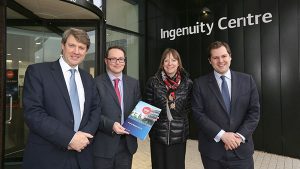 The University welcomed not one, but two ministers in early March, to coincide with the announcement of a Government fund of £10m, which will help institutions develop university-industry collaboration.
The University welcomed not one, but two ministers in early March, to coincide with the announcement of a Government fund of £10m, which will help institutions develop university-industry collaboration.
The new fund was launched by Universities Minister Chris Skidmore, and Exchequer Secretary to the Treasury Robert Jenrick MP, during their visit to Jubilee Campus, to announce the new University Enterprise Zones being set up around the country. The University has successfully piloted a UEZ that is supporting start-ups and enterprises in the East Midlands.
BBC1 Sunday Politics and the Times Higher reported on the visit, which took in the Ingenuity Lab, which supports start-up businesses from across the East Midlands. The funding will be used to encourage universities to work more closely with local businesses to boost economic growth.
University Vice-Chancellor, Professor Shearer West, told the Nottingham Post: “We are immensely proud of what has been achieved so far at the University Enterprise Zone, and plan to build on its success by developing both the site and the services it offers in a way that benefits the world around us.
“As a University, we firmly believe that our research expertise can make a valuable contribution to progress both by using technology and ideas to solve some of the problems we’ll face in the future, and by creating opportunities for the partners we work with and the people of our home city.”
Later in the day, Professor Sir Martyn Poliakoff, held a ‘Ministerial Periodic Table of Videos LIVE!’ event and introduced MP Chris Skidmore to some live science. 2019 is International Year of the Periodic Table and Nottingham is celebrating the 150th anniversary of Dmitri Mendeleev’s discovery of the Periodic System, throughout the year.
Dozens killed in New Zealand terror attacks
 50 people were killed and another 50 were wounded in shootings at two mosques in Christchurch, New Zealand, during Friday Prayer on 15 March.
50 people were killed and another 50 were wounded in shootings at two mosques in Christchurch, New Zealand, during Friday Prayer on 15 March.
The gunman live-streamed footage of his rampage to Facebook, filmed with a head-mounted camera, firing indiscriminately at men, women and children from close range, in what is the deadliest attack in the country’s history.
Reacting to the shocking news, Media Relations Manager for Arts and Social Sciences Charlotte Anscombe approached Dr Afzal Ashraf, an expert in terrorism at the University, to offer insight into the violent shootings for the media. In the immediate aftermath he spoke to Sky News, Deutsche Welle, Talk Radio, TRT World and BBC Scotland:
“I am not as surprised as perhaps others would be… sadly, this is a scourge that has hit the world,” he said.
“The fact that people in mosques are being gunned down is not new. It is happening almost on a monthly basis, certainly several times a year in other Muslim countries, in the Middle East and Southeast Asia. Extremist terrorists attack people in mosques. They attack them in churches. They attack them in synagogues. The shocking thing about this, is the location… a country which hasn’t seen this form of vile terrorism, sadly has fallen victim to it.”
Chemical pollutants degrade fertility in both men and dogs
New research by scientists at the University of Nottingham suggests that environmental contaminants found in the home and diet have the same adverse effects on male fertility in both humans and in domestic dogs.
Emma Rayner, Media Relations Manager for Medicine and Health Sciences, worked with academics in the School of Veterinary Medicine and Science to promote the research, which resulted in the Times, the Mail Online, the Express, the Sun and Newsweek all reporting on the story.
Tom Whipple writing for the Times, said: “Dogs, as everyone knows, grow to look like their owners. Over years of companionship they gain our habits, our hairstyles, our waistlines. Now scientists have shown the same also applies to something more intimate: our sperm quality.”
The Nottingham team set out to test the effects of two specific man-made chemicals — namely the common plasticizer DEHP, widely abundant in the home, and the persistent industrial chemical polychlorinated biphenyl 153, which although banned globally, remains widely detectable in the environment including food. The results show that the chemicals, at concentrations relevant to environmental exposure, have the same damaging effect on sperm from both man and dog.
Professor Richard Lea, said: “This new study supports our theory that the domestic dog is indeed a ‘sentinel’ or mirror for human male reproductive decline. And our findings suggest that man-made chemicals that have been widely used in the home and working environment may be responsible for the fall in sperm quality reported in both man and dog that share the same environment.”
Filming on campus
A new weapon in the fight against crime?
 The University of Nottingham and the University of Derby have made a new breakthrough in fingerprint technology that could lead to more criminal cases being solved, by developing a way of detecting fingerprints on metal surfaces like knives and bullet casings.
The University of Nottingham and the University of Derby have made a new breakthrough in fingerprint technology that could lead to more criminal cases being solved, by developing a way of detecting fingerprints on metal surfaces like knives and bullet casings.
Dr James Sharp of the School of Physics and Astronomy, who is developing the technology at the heart of the new molecular technique, revealed that already one police cold case murder team has been in touch to ask for help. BBC1 East Midlands Today’s Mike O’Sullivan visited both universities to report on the technology at the heart of the new molecular technique and how it is being developed.
The new method involves a very sensitive and non-destructive ion beam technique to scan the surface of an object to look for traces of material. The ion beams are looking for the oils and salts present in fingerprint sweat.
Media Relations Manager for Science, Lindsay Brooke, worked with Dr Sharp to highlight the fascinating and innovative research. Dr Sharp made a further media appearance on BBC1’s Crimewatch Roadshow to explain the challenges faced when trying to lift fingerprints from metallic objects.
“When you are trying to retrieve fingerprints from knife blades, exposure to environmental conditions means the fingerprints get washed away and conventional techniques do not work as well,” he said.
Celebrating our EU staff through food
 Don’t try to predict anything in the world of British politics right now. It’s still unclear if and when Brexit is going to happen, and for tens of thousands of EU nationals living in the East Midlands, it’s all hugely unsettling.
Don’t try to predict anything in the world of British politics right now. It’s still unclear if and when Brexit is going to happen, and for tens of thousands of EU nationals living in the East Midlands, it’s all hugely unsettling.
Jeremy Ball, Social Affairs Correspondent at BBC1 East Midlands Today reported live from the University, who put on an event to celebrate its EU staff. Around 800 employees from all over Europe were invited to a ‘fuddle’ where everyone brought their national dessert. Offerings varied from cakes from Italy, to Sweden, to the Czech Republic.
But the event wasn’t just about food, it was also about people’s futures. Dr Gabriele Neher and Assistant Professor Chrysanthi Gallou explained to Jeremy the shift in attitudes towards them.
University Registrar Dr Paul Greatrix, said: “We want to celebrate the achievements of our EU staff. To recognise that at a time of great uncertainty, they needed some reassurance, and we wanted to stress they are really important, valued members of our University community.
“For those who have been here for many years, it is still deeply unsettling because the future is very uncertain. We need to offer them the reassurance that whatever else may happen, we care about them and we want them to continue to work and prosper here.”
And finally… the stats
No comments yet, fill out a comment to be the first


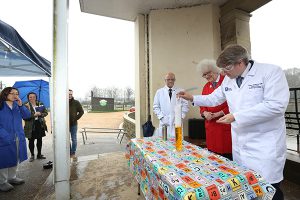
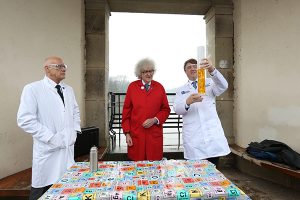
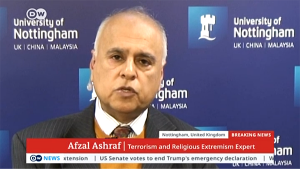
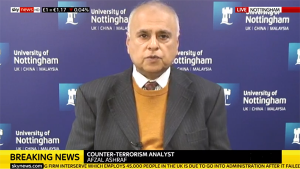

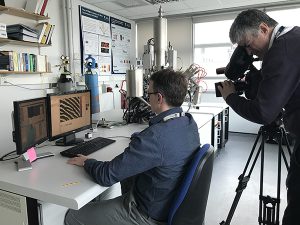
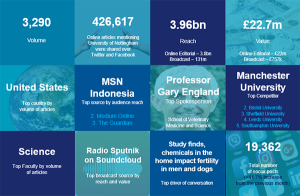
Leave a Reply